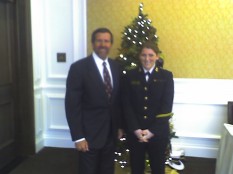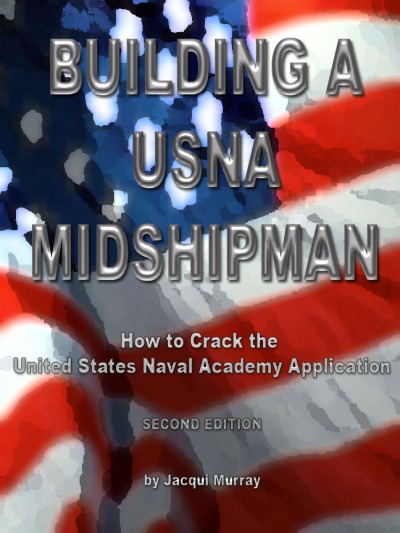 Here’s my previous post about an introduction to the importance of the Congressional Interview to attending Military Academies. Thanks to the Structured Learning workbook on Building a Midshipman for this:
Here’s my previous post about an introduction to the importance of the Congressional Interview to attending Military Academies. Thanks to the Structured Learning workbook on Building a Midshipman for this:
The final stage in your pursuit of a Congressional nomination to a United States Service Academy is a personal interview…” This letter, received April 30th of your Junior year, confirms that your Congressman remains aware of your continued interest in the Service Academy interview and nomination.
A year ago, at the Service Academy night, you listened to the presentations from each of the five Service Academies, and then introduced yourself to Congressman Cox’s assistant, Ms. Leslie Duvall, to let her know you would be applying for a nomination. She suggested you get in touch in spring for a packet. Interviews would be the following November. On April 30th, you received a confirmation letter, outlining what the Congressional Nomination packet would include:
- a completed Application for Nomination
- a resume (based on an enclosed sample)
- a short essay discussing your reasons for seeking admission to a Service Academy
- a photo
- SAT examination results
- three letters of recommendation.
 Yes, this is an involved package, but doable. The Academies suggest that applicants pursue nominations not just from their Congress people, but from both Senators and the Vice President. Each US Congressperson has a finite number of nominations, and it varies depending upon how many of his nominated people were appointed and currently attend an Academy (it turns out this is a complicated formula).
Yes, this is an involved package, but doable. The Academies suggest that applicants pursue nominations not just from their Congress people, but from both Senators and the Vice President. Each US Congressperson has a finite number of nominations, and it varies depending upon how many of his nominated people were appointed and currently attend an Academy (it turns out this is a complicated formula).
You follow this advice. You first compile all materials for Congressman Cox and hand-carry it to his office during summer break, partly to be sure it arrives, but also in hopes of getting a chance to re-introduce yourself.
The Senatorial packages require similar materials to those requested by Congressman Cox: A personal statement, resumes, three more letters of recommendation—for each—and their preferred application cover form. When you’ve collected the necessary materials, you FedEx it and follow up on its safe arrival.
The Vice President—thank goodness—uses the application materials submitted to the Academy. You need only fill out a one-page form that notifies him of your interest and summarizes what you send to the Academies. This, too, you send via FedEx.
While you wait, you stay in touch with the Congressman by calling with questions, attending other Academy Nights and stopping by to chat. You never actually talk with him in the office, but you do become familiar with the location of his office, the layout, and his staff. Unfortunately, you can’t do that with the Senators. You do call with a question, but you don’t even reach anyone on the committee. You decide you must trust fate with those nominations.
Finally, on November 7th, you receive notice of your interview—it’ll be 3 December, at 2pm—no problem—you can skip cross country for something this important.
You reread all materials in all the books you purchased, as well as online suggestions about how to ace the Congressional interview (if there were a class, you’d take it).
You think about each possible question, go over them in your head, and insure you have an honest, straightforward answer for all of them. You decide honesty is the best policy. You won’t try to impress them, just hope your background, resume and credentials do that for you. You spend time on the phone with your Blue and Gold Officer reviewing potential questions and your answers.
Jacqui Murray is the author of the popular Building a Midshipman, the story of her daughter’s journey from high school to United States Naval Academy. She is webmaster for six blogs, an Amazon Vine Voice book reviewer, a tech columnist for TeachHUB and Examiner.com, Editorial Review Board member for ISTE’s Journal for Computing Teachers, and freelance journalist on tech ed topics. Currently, she’s editing a thriller for her agent that should be out to publishers this summer.





































[…] How to Prepare for the Congressional Interview–Part I […]
LikeLike
By: October To Do List for USNA Applicants | USNA or Bust! on 09/29/2014
at 00:50
[…] How to Prepare for the Congressional Interview–Part I […]
LikeLike
By: Congressional Interview–It’s Time | USNA or Bust! on 10/27/2014
at 00:23
[…] How to Prepare for the Congressional Interview–Part I […]
LikeLike
By: November To Do List for USNA Applicants | USNA or Bust! on 11/03/2014
at 00:52
[…] How to Prepare for the Congressional Interview–Part I […]
LikeLike
By: December To Do List for USNA Applicants | USNA or Bust! on 12/01/2014
at 00:51
[…] How to Prepare for the Congressional Interview–Part I […]
LikeLike
By: June To Do List for USNA Applicants | USNA or Bust! on 06/01/2015
at 00:09
[…] How to Prepare for the Congressional Interview–Part I […]
LikeLike
By: July To Do List for USNA Applicants | USNA or Bust! on 07/01/2015
at 00:10
[…] How to Prepare for the Congressional Interview–Part I […]
LikeLike
By: August To Do List for USNA Applicants | USNA or Bust! on 08/01/2015
at 00:11
[…] How to Prepare for the Congressional Interview–Part I […]
LikeLike
By: September To Do List for USNA Applicants | USNA or Bust! on 09/14/2015
at 00:08
[…] How to Prepare for the Congressional Interview–Part I […]
LikeLike
By: The Congressional Interview | USNA or Bust! on 09/20/2016
at 01:00
[…] How to Prepare for the Congressional Interview–Part I […]
LikeLike
By: What’s Happening in October at USNA | USNA or Bust! on 10/01/2017
at 00:12
[…] How to Prepare for the Congressional Interview–Part I […]
LikeLike
By: June To Do List for USNA Applicants update | USNA or Bust! on 06/02/2022
at 02:20
[…] How to Prepare for the Congressional Interview–Part I […]
LikeLike
By: July To Do List for USNA Applicants update | USNA or Bust! on 07/02/2022
at 02:21
[…] How to Prepare for the Congressional Interview–Part I […]
LikeLike
By: August To Do List for USNA Applicants update | USNA or Bust! on 08/02/2022
at 02:21
[…] How to Prepare for the Congressional Interview–Part I […]
LikeLike
By: October ToDo for USNA Applicants | USNA or Bust! on 10/02/2022
at 02:20
[…] How to Prepare for the Congressional Interview–Part I […]
LikeLike
By: November Checklist for USNA Applicants | USNA or Bust! on 11/02/2022
at 02:24